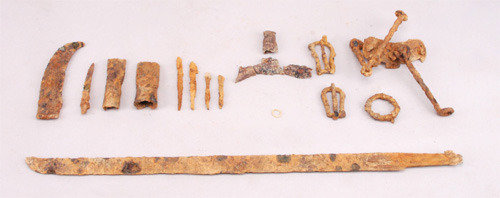Ancient horse harnesses excavated in North Jeolla Province
Ancient horse harnesses excavated in North Jeolla Province
Posted November. 09, 2017 07:48,
Updated November. 09, 2017 10:00

A set of horse harnesses have been discovered in an ancient grave in Jangsu, North Jeolla Province, showing that the grave belong to a man of the ruling class in Gaya confederacy in the sixth century.
The Jeonju Cultural Heritage Research Institute said Wednesday that it excavated the harnesses, including a bit, footrests and decorations, from one of a cluster of ancient graves in Dongchon-ri, Jangsu, North Jeolla Province. Two years earlier, a nailed horseshoe was dug out from another grave in the same site.
Among the newly excavated items, the bit was ringed and in the shape of the alphabet “F,” the same as those found in large Gaya grave sites in Goryeong, North Gyeongsang Province and Hapcheon, South Gyeongsang Province. As only noblemen owned horse harnesses during the Three Kingdoms Period, F-shaped bits are believed to be rare luxury items at that time.
There are 80 graves at the Jangsu site. The grave where the harnesses were discovered measures 27 meters long, 20 meters wide and 2.5 meters high. It is a medium-sized grave among those in the cluster.
A main container for the grave owner’s body and two others for his belongings were also found within the grave. Some historians argue that the parallel placement of the containers resembles that of Gaya graves and that the grave originated from Mahan, a tribal state of the Gaya confederacy.
In addition, various earthenware items were also excavated, including long- and short-necked jars, saucers and lids. The excavators say that the earthenware goods has mixed factors from those of Baekje, Sogaya and Daegaya.
“The ancient Jangsu area was a major iron producing region,” said Kwak Jang-geun, a professor of history at Kunsan National University. “It seems that earthenware goods from other regions were carried into this area during the process of iron exchanges.”
Sang-Un Kim sukim@donga.com
Headline News
- Med professors announce intention to leave hospitals starting Thursday
- Bridge honoring Sgt. Moon Jae-sik unveiled in Pennsylvania
- Chief of Staff Chung tells presidential secretaries to stay away from politics
- US FTC bans noncompete agreements
- N. Korea launches cyberattacks on S. Korea's defense companies







